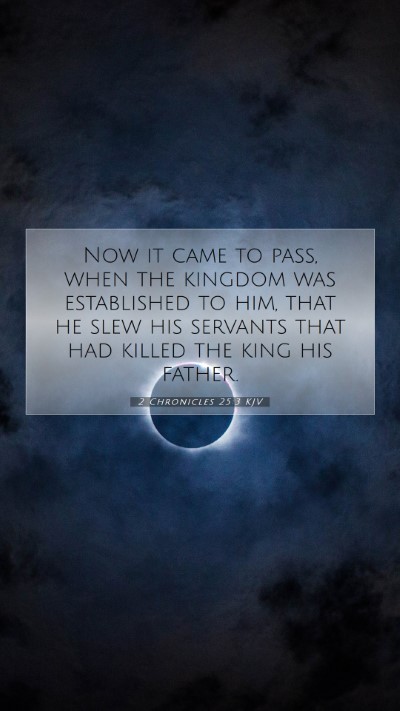2 Chronicles 25:3 - Bible Verse Meaning and Commentary
Verse: "Now it came to pass, when the kingdom was established unto him, that he slew his servants that had killed the king his father."
Overview and Significance
This verse provides insight into the actions of Amaziah, the king of Judah, following his rise to power. It highlights a critical moment in his reign that reflects upon the broader themes of justice, retribution, and the complexities of leadership.
Bible Verse Meanings
- Establishment of Authority: Amaziah's ascension to the throne symbolizes the establishment of new leadership after the death of his father. It marks a transition and the challenges that come with authority.
- Act of Retribution: The act of killing the servants who conspired against his father suggests a theme of vengeance. This action illustrates the deep personal motives driving political decisions in ancient contexts.
- Moral and Ethical Implications: The ethical considerations behind Amaziah's actions raise questions about justice and mercy. Scholars often debate whether this retributive justice aligns with biblical principles.
Bible Verse Interpretations
In interpreting 2 Chronicles 25:3, various commentaries provide insights reflecting on the character and intentions of Amaziah:
- Matthew Henry: Henry emphasizes the impulsive nature of Amaziah's revenge. He points out that while it may have been politically motivated, it also reflects a troubling impulse towards violence that characterizes many leaders of his time.
- Albert Barnes: Barnes notes the historical context, suggesting that Amaziah's reign experienced turmoil from the previous regime's conspiracies. He frames this action as a struggle for power that often includes eliminating opposition.
- Adam Clarke: Clarke focuses on the psychological aspects of Amaziah's decision, indicating that such actions often lead to further complexities in governance and highlight the nature of human emotion intertwined with leadership.
Biblical Exegesis
Understanding this passage requires examining the social and political climate of Judah at the time:
- Political Context: The assassination of Amaziah's father creates a backdrop of instability and fear that leads to the king's retributive actions.
- Historical Parallels: Similar themes of revenge and consolidation of power can be observed throughout the Old Testament, framing Amaziah's actions within a larger narrative of biblical history.
Application of 2 Chronicles 25:3
This verse invites reflection on the moral dilemmas of leadership and the consequences of revenge:
- Leadership Lessons: Those in positions of authority should consider the lasting impact of their decisions, focusing on wisdom and justice rather than mere retribution.
- Personal Reflection: Believers are encouraged to think critically about their responses to betrayal and conflict, emphasizing forgiveness and reconciliation where possible.
Related Bible Cross References
- 2 Kings 14:5-6 - Reflects similar themes of Amaziah's reign and the consequences of vengeance.
- Matthew 5:38-39 - The New Testament teachings on turning the other cheek contrast with Amaziah's actions.
- Romans 12:19 - Reaffirms the principle of leaving vengeance toGod, offering a moral perspective that challenges Amaziah's decision.
Conclusion
In conclusion, 2 Chronicles 25:3 serves as a significant narrative that opens discussions about leadership, justice, and the human heart's complexities. By interpreting this passage through biblical commentaries and exegesis, readers gain valuable Bible study insights that can be applied to both historical understanding and personal conduct.


